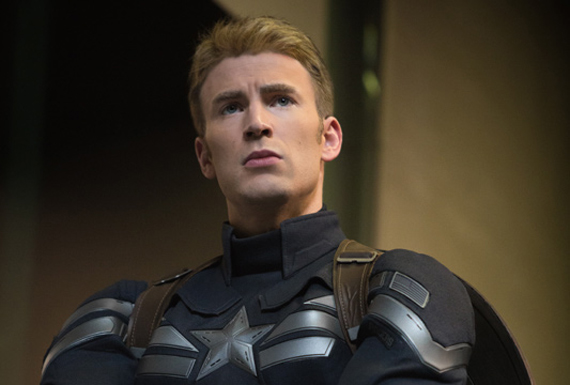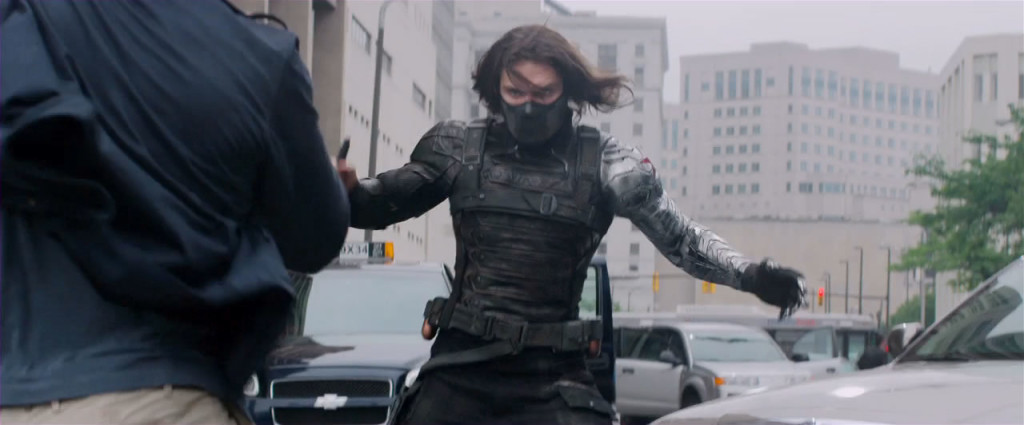Genre: Action/Superhero
Premise: (from IMDB) Steve Rogers (aka Captain America) struggles to embrace his role in the modern world and battles a new threat from a nemesis shrouded in mystery, the one known only as the “Winter Soldier.”
About: Captain America smashed April records, bringing in 96 million dollars this weekend. It was written by mainstream writing titans Christopher Markus and Stephen McFeely, who have written a Thor movie, the Chronicles of Narnia movies, and three (yes, the next one too) Captain America films. If you need to find these guys, look north of Sunset. One of the main choices the team was faced with, since most of Captain America’s life existed in the 1940s, was whether to include a lot of flashbacks. In an early draft, they did just that, before the flashback structure became “unwieldy.” Eventually, they came to the conclusion most writers do when dealing with flashbacks: “You [include flashbacks] when you don’t have enough interesting stuff [happening] in the present.” I agree wholeheartedly!
Writers: Christopher Markus & Stephen McFeely (story by Ed Brubaker) created by Joe Simon and Jack Kirby
Details: 136 minutes
Captain America is a strange beast and one of the more surprising successes of the Marvel Universe. At his core, the Captain is a cheesy on-the-nose supster, the kind of hero made for another era. “Captain” “America.” How ridiculous does that sound when you say it out loud?
The unusually stiff Chris Evans embodies that on-the-nose idealism perfectly. Captain America is a big fat square, the kind of guy who’s going to remind you you didn’t put your turn signal on before changing lanes. To that end, you’d think people would be annoyed by him. But for some reason, they’re not. And I went to “The Winter Soldier” to find out why.
“The Winter Soldier” focuses on the aforementioned Steve Rogers (Captain America), a pint-sized nobody who enlisted during World War 2, only to be genetically modified into a giant hulking super-soldier. With a shield! Due to some tricky timeline logistics that required Captain America to be in The Avengers movie, a silly storyline was thought up where he was frozen for 70 years and unthawed in the present.
Steve now works for the U.S. Government as well as the secret super-hero agency, S.H.I.E.L.D., and is finding himself routinely disillusioned with his role. Whereas it used to be clear who the good guys and bad guys were, now it seems like half the guys on his teams have ulterior motives, including the sexy Black Widow (played by Scarlett Johanssen), who’s always disappearing to snatch up a USB drive or two that Steve had no idea about.
Eventually, Steve’s boss, Nick Fury (Samuel Jackson) is attacked by a mysterious baddie, known to the few who have seen him as the “Winter Soldier.” Steve eventually realizes that S.H.I.E.L.D. is actually corrupt from the inside, and that those ulterior motives everyone had were a precursor to a much bigger plan to use S.H.I.E.L.D. to take over the U.S. government, and eventually the world!
The most obvious question one comes up with after they watch Captain America is: What the heck is “super-hero” about this guy??? He has a SHIELD. That’s it. A shield! That he uses to block stuff and occasionally throw at people. If that’s all it takes to become a super hero, give me half an hour and a trip to Target and I can be a super-hero, too.
That question can be extended to our bad guy as well, the Winter Soldier. The man has one really strong metal arm. That’s his “super power.” Here’s a question. Why didn’t they add a second super arm? Wouldn’t that have made him twice as formidable? I mean, what’s the logic in stopping at one?
And let’s talk about Black Widow. What is her super power? Being able to squeeze into a very tight latex outfit? Or Falcon? He has mechanical wings that allow him to fly around and distract people? These are super powers??? What ever happened to real super powers? Like Superman???
That’s what annoys me about the superhero universe. Things can be so arbitrary and we’re just asked to go with it because… well, because! The truth is many of these characters were designed in an era and in a medium that wasn’t subjected to the same kind of scrutiny we subject our movie characters to today.
And it leads to an interesting dilemma for the writers, one that some of you will have to deal with one day when you’re writing a superhero movie. Do you stick with the origins of the character to make the original fans happy? Or do you improve upon them to make the character more logical and realistic?
I guess, in the end, you’re either going to go with this flimsy-ruled world or you’re not. If you go with it, Captain America’s a pretty good movie. One of the main reasons for this is they built the story from the inside out. What I mean is that Markus and McFeely first asked who Captain America was, and then what the best situation would be to challenge that person (instead of coming up with a plot first and trying to wedge Captain America into it).
They realized that Captain America was very black and white. He grew up in a time where it was clear who the good guys and the bad guys were. You got your orders and you followed them without question. That was Captain America’s “comfort zone.”
Your job as a writer is to take your character out of their comfort zone. So this movie is about how grey the world has become. How, when a mission goes down these days, you’re not sure if you’re on the right side or not, if the guy next to you is on your team or someone else’s. That stuff starts to eat at Captain America. And it’s what gives this movie an extra layer or two.
It’s a great thing to remember when you’re writing one of these big “summer-type” films. You can make your script deeper simply by challenging your main character with some kind of inner conflict. Add a theme as well (in this case, the theme deals with “trust”) and you have a more sophisticated blockbuster than 80% of the writers out there.
But let’s be honest, when you’re talking about a popcorn flick, the average moviegoer is judging you by your action scenes. Are they unique? Are they fun? Do they get you off your seat? For the most part, the action in Captain America was above average. But there were two scenes in particular that stood out. The Nick Fury car scene and the Captain America gets accosted by 20 men in the elevator scene.
The reason these scenes were cool was because a) we cared about the characters in danger. b) the stakes were high. c) the scenarios were impossible to get out of, and d) it was easy to understand what was going on. See, that last one is the biggie. You can get carried away with an action script, believing your set pieces have to have a million things going on at once. But actually, some of the simplest scenarios are the ones that work best. Nick Fury trapped in this car surrounded by 40 men with AK-47s unloading a non-stop barrage of bullets at him – we’re engaged because we’re wondering how the hell he’s going to get out of this, but also because it’s so easy to understand what’s going on.
Contrast that with the finale of Captain America. I didn’t know what the hell was going on in the climax. There were 18 different things happening at once and I’d forgotten what the ultimate goal was other than to “stop the bad guys.” It was a classic case of “throw everything and the kitchen sink” at the viewer, with them not realizing that we can’t see anything through a kitchen sink. The contrast between those simple and complex action scenes working (or not working) really opened my eyes.
All in all, I’d place The Winter Soldier as the third best Marvel film made so far, behind Iron Man and The Avengers. I still think Steve Rogers is kind of boring when you compare him to other super heroes, but the writers did a really good job creating that inner conflict inside of him, getting as much out of the character as humanly possible. The film did leave me with some questions (why didn’t Iron Man, Bruce Banner, or Thor stop by to help if the world was in danger?) but I guess with these comic book films, a certain amount of logic must be thrown out the window to enjoy them.
[ ] what the hell did I just watch?
[ ] wasn’t for me
[x] worth the price of admission
[ ] impressive
[ ] genius
What I learned: The power of the contained action scene. Like I said above, the instinct is to go big and crazy. But the bigger and crazier you go, the harder it is for the audience to keep up with what’s happening. Sometimes the best scene is a simple one. Put your character in an elevator with two dozen bad guys and see how they get out of it.



